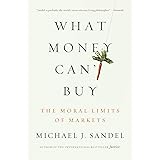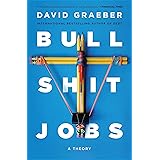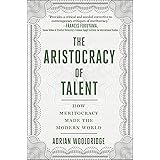Buy new:
$32.93$32.93
Save with Used - Good
$16.15$16.15
Ships from: Amazon Sold by: t.rey treasures

Download the free Kindle app and start reading Kindle books instantly on your smartphone, tablet, or computer - no Kindle device required.
Read instantly on your browser with Kindle for Web.
Using your mobile phone camera - scan the code below and download the Kindle app.

OK
 Audible sample Sample
Audible sample Sample 


The Tyranny of Merit: What's Become of the Common Good? Paperback – September 10, 2020

Explore your book, then jump right back to where you left off with Page Flip.
View high quality images that let you zoom in to take a closer look.
Enjoy features only possible in digital – start reading right away, carry your library with you, adjust the font, create shareable notes and highlights, and more.
Discover additional details about the events, people, and places in your book, with Wikipedia integration.
Purchase options and add-ons
Michael J. Sandel argues that to overcome the polarized politics of our time, we must rethink the attitudes toward success and failure that have accompanied globalisation and rising inequality. Sandel highlights the hubris a meritocracy generates among the winners and the harsh judgement it imposes on those left behind. He offers an alternative way of thinking about success - more attentive to the role of luck in human affairs, more conducive to an ethic of humility, and more hospitable to a politics of the common good.
- Print length272 pages
- LanguageEnglish
- PublisherAllen Lane
- Publication dateSeptember 10, 2020
- Dimensions6.02 x 0.83 x 9.21 inches
- ISBN-100241407605
- ISBN-13978-0241407608
The Amazon Book Review
Book recommendations, author interviews, editors' picks, and more. Read it now.
Frequently bought together

Similar items that may deliver to you quickly
 For the more we think of ourselves as self-made and self-sufficient, the harder it is to learn gratitude and humility. And without these sentiments, it is hard to care for the common good.Highlighted by 2,684 Kindle readers
For the more we think of ourselves as self-made and self-sufficient, the harder it is to learn gratitude and humility. And without these sentiments, it is hard to care for the common good.Highlighted by 2,684 Kindle readers The meritocratic ideal is not a remedy for inequality; it is a justification of inequality.Highlighted by 2,176 Kindle readers
The meritocratic ideal is not a remedy for inequality; it is a justification of inequality.Highlighted by 2,176 Kindle readers In an unequal society, those who land on top want to believe their success is morally justified. In a meritocratic society, this means the winners must believe they have earned their success through their own talent and hard work.Highlighted by 1,889 Kindle readers
In an unequal society, those who land on top want to believe their success is morally justified. In a meritocratic society, this means the winners must believe they have earned their success through their own talent and hard work.Highlighted by 1,889 Kindle readers
From the Publisher


Product details
- Publisher : Allen Lane (September 10, 2020)
- Language : English
- Paperback : 272 pages
- ISBN-10 : 0241407605
- ISBN-13 : 978-0241407608
- Item Weight : 12.5 ounces
- Dimensions : 6.02 x 0.83 x 9.21 inches
- Best Sellers Rank: #1,901,565 in Books (See Top 100 in Books)
- Customer Reviews:
About the author

Michael Sandel teaches political philosophy at Harvard University. He has been described as a “rock-star moralist” (Newsweek) and “the world’s most influential living philosopher.” (New Statesman) Sandel’s books--on justice, ethics, democracy, and markets--have been translated into more than 30 languages. His legendary course “Justice” was the first Harvard course to be made freely available online and has been viewed by tens of millions. His BBC series “The Global Philosopher” explores the ethical issues lying behind the headlines with participants from around the world.
Customer reviews
Customer Reviews, including Product Star Ratings help customers to learn more about the product and decide whether it is the right product for them.
To calculate the overall star rating and percentage breakdown by star, we don’t use a simple average. Instead, our system considers things like how recent a review is and if the reviewer bought the item on Amazon. It also analyzed reviews to verify trustworthiness.
Learn more how customers reviews work on Amazon-
Top reviews
Top reviews from the United States
There was a problem filtering reviews right now. Please try again later.
“To renew the dignity of work, we must repair the social bonds the age of merit has undone.”
If you’re interested in better understanding what’s wrong with American society and why, if you want to understand why life seems so hard these days, this is a book you should read.
On a more personal note, there was a section of the book that really "hit home" for me. Namely, the "Wounded Winners" section under Chapter 6. I teach computer science courses at a high school in a relatively affluent district in which many students come from households with high-achieving parents (doctors, engineers, military officers, etc.), many of whom went to Ivy League schools themselves. When I observe my students, I can definitely see the negative psychological consequences of the types of academic pressure and helicopter parenting that Professor Sandel describes in this chapter. It is probably more pronounced to me than to my coworkers because I recently transitioned into this profession after an engineering career while my fellow teachers started teaching after college. When I was in high school, we (and our parents) found out about our grades every few months when report cards came out. Now, students and parents can check grades several times a day, and the stress that this causes the students is very obvious to me - I will often get comments about a grade I entered sometimes minutes after I enter it into the electronic grade book. Also, I was taken aback when I learned the statistics on depression and suicidal ideation within my district when I started teaching, but now that I see the pressure these students are under I can definitely understand. Sadly, there is little acknowledgment from the district of the relationship between academic pressure and psychological issues - instead, there is a mentality that the mental health problems can be rectified by adding more work to the students in the form of "social and emotional learning" exercises.
To summarize, I think that this book contains some excellent insights, and I recommend this to anyone trying to gain a better understanding of the problems of meritocratic thinking and where we ought to go from here.
I will summarize the author’s key points, then comment on how effectively the author makes his points – both in terms of style and content, and then provide some of my perspective after having read the book.
The author starts with the baseline idea that the U.S. was founded on the principle that all citizens be able to improve their social and economic status based on talent and effort, i.e., merit. This is in obvious contrast to the rigid heredity-based class system of England and Europe from which most of colonists originated. Jefferson talked about creating a “natural” aristocracy based on virtue and talent rather than the “artificial” aristocracy based on birth.
The author then explores three questions relative to this founding idea:
1. How is the U.S. doing in delivering on this promise of meritocracy? And what have been the political implications?
2. To the extent we have created a meritocratic society, is this a positive situation? What are the benefits, what are the issues?
3. What are alternatives to the ideal of a pure meritocracy?
The first question has been explored by others. A consensus might be that a) the U.S. has been and is more meritocratic than 18th century England or Europe, b) many Americans over the past 250 years have risen socially and economically above their birth position, but c) over the last 30 – 40 years, American social and economic mobility has stagnated, e.g., the probability of a person born into the lowest income quintile moving into the highest quintile is ~ 5%, and even the probability of that person moving into one of the top three quintiles (40 – 100%) is only 33%. At the same time the social and economic mobility within European countries like Germany and the Scandinavian countries has surpassed that of the U.S. We have a meritocratic philosophy, but on an absolute and relative basis, we are currently falling short of delivering on that promise. One of the key theoretical enablers of a meritocracy is education in general, and a college education specifically. The author explores the use of higher education as meritocratic “sorter”, concluding that our current system is not enabling social / economic mobility. As proof points he points out that two-thirds of U.S. adults do not have a college degree, and birth family income level is currently a highly reliable predicator of educational achievement. The author concludes, that to the extent we have delivered on the meritocratic promise, we have a) created an educated, economic elite that looks down on those in the lower economic tiers, and now b) have recently made the tools of mobility, e.g., higher education, more exclusive.
The answer(s) to the second question is clearly intended to be the unique contribution of the book. The author states that while continuing to strive toward improving our meritocracy is worthwhile, we need to understand that equality of opportunity will never equal equality of outcome, i.e., meritocracy will create a class structure, this one based on the wealth and status, that result from talent and credentials. This creates an educated class that is intolerant of the less educated class, with the less educated having little respect and less trust for the educated class. Interestingly, he suggests that, given that a pure meritocracy would result in a class structure truly based on the talent and efforts of the individual, versus birth position, those on the top will likely feel MORE entitled and arrogant, and those on the bottom MORE resentful, than in a class-based system like 18th century England.
The author suggests these two factors a) stagnating economic and social mobility, and b) mutual distrust between the college educated “elites” and the non- college educated has created the cultural divide we see playing out in our political sphere. Specifically, it is causing a realignment of political parties with the Democratic Party becoming the party of the college educated, and the Republican Party becoming the party of the less educated. Clearly there are exceptions to this rule, including high school educated Black voters continuing to vote largely Democratic, with college educated social conservatives continuing to vote largely Republican.
The author does explore alternatives to a pure meritocracy by philosophers like Hayek and Rawls, i.e., free market liberalism – no attempt to create equality except in the justice system, but conceptually splitting moral and economic value of talent; and welfare liberalism – equality of outcome created by meritocracy winners sharing benefits of success with those less fortunate.
The author concludes that continued progress toward equality of opportunity is necessary and helpful, but not sufficient, toward creating a society where everyone – or at least most – can find a place and feel valued. Specifically, he suggests we need to strive toward creating circumstances where people who are not upwardly mobile – for whatever reason, e.g., with talents that are not as valued by society as others, can flourish in place, relying on social institutions and shared community resources, including financial support.
My view is that the author successfully presents his case that, in the U.S., our progress toward creating a meritocracy has stalled. However, I take issue with several points:
1. While I am as convinced as anyone in the value of education, I do not subscribe to the notion that a high level, liberal arts college degree, Harvard, Stanford, etc., is currently the only avenue to a successful life. Other countries do a better job than we do in the U.S. of offering affordable alternatives, e.g., trade schools, and we should work to improve, but hard work to find a profitable, rewarding niche is likely to pay off for the diligent.
2. The author argues that our system of higher education (he focuses on the top schools) does not currently enable upward mobility. He cites statistics that show only a small percentage of the college educated rise from the lowest quintile to the highest. However, he neglects to cite the percent of students who come from the lowest quintile that achieve the highest but does indicate the problem is mostly the small number of low quintile students admitted. And he points out that affirmative action programs are largely focused on achieving racial diversity, a worthy objective as well, but are not focused on upward mobility for the lowest quintile. This suggests our higher education system COULD be an upward mobility enabler for the lowest quintile with emphasis and resources.
As regards the author’s points about the downsides of a meritocracy:
1. I agree that the downsides he identifies can go a long way toward explaining the cultural divide in which we currently find ourselves, including the attitudes and behavior, e.g., voting patterns, of the less educated segment of the country. Therefore, I believe the book is an important read – yes, the outcome of a meritocracy, even one more advanced than ours, creates cultural problems.
2. However, the author never really makes a case for an alternative – he does not, and neither does anyone else of whom I am aware, advocate we revert to the class system of 18th century England. His discussion of Hayek comes the closest to suggesting an alternative, but Hayak is more of a band aid to the problem, i.e., philosophically splitting the moral and economic value of talent, than a practical solution.
3. Even if we were to arrive at a utopian alternative in the U.S., it is worth remembering a) the natural order is a meritocracy, i.e., the strongest, smartest do best at the evolutionary game, and b) the international order is based on merit – or at least strength and intelligence. The continued success of the U.S. economy and military depend on our best and brightest rising to the top and being rewarded appropriately – if reasonably.
So, my post read conclusions are:
1. Yes, we have a meritocracy in the U.S., but one that has become clogged in its ability to enable upward mobility for all. We need to work to unclog it, particularly by a) continuing to broaden the types of educational opportunities available to fit a range of talents and financial resources, and b) working harder to enable lower quintile individuals into the system.
2. Yes, even an improved meritocracy will create a range of outcomes for individuals, i.e., income / social classes. As Rawls suggests in his welfare liberal philosophy, the winners will need to share rewards with those who do not win. There will always be disparity of outcomes, even with sharing, but it does not have to be the wealth / income gap we are seeing today. We have examples in the Scandinavian countries that can provide idea - not prescription.
3. The world we live in is menacing. We are going to need to deal with climate change, a potentially apocalyptic challenge without borders. And, while the U.S. has been the undisputed economic world power since the end of WWII and, for much of that time, the dominant military powers, those positions will come under increasing pressure. We need our very best to rise to address these challenges. First, we need to remove all barriers to finding our “best”, regardless of gender, race, or income class. Second, we need to ensure everybody, regardless of whether they are in the “best” category, are included – “united we stand, divided we fall”. Finally, we need to reinforce our traditional ability to attract the “best” from abroad. Being a magnet for immigration is truly our trump card (pun intended).
Tyranny of Merit is an important book, not perfect but an important read.
















